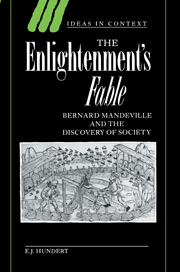Book contents
Introduction and agenda
Published online by Cambridge University Press: 23 November 2009
Summary
In the spring of 1723, a London physician nearing his fifty-third birthday anonymously published an enlarged version of a barely noticed satire which he had written nine years earlier. The work aroused little immediate reaction. Then, during the following July, The Fable of the Bees: Or, Private Vices, Publick Benefits was twice presented by the Grand Jury of Middlesex to the Court of the King's Bench as a public nuisance, with a recommendation that its publisher be prosecuted. While the book was never censored, its author, Bernard Mandeville, “Snatched from Oblivion's Grave by Infamy,” at once became associated with wickedness. The Fable of the Bees was immediately reviled by a chorus of clergymen, journalists and philosophers. Astonished and delighted, Mandeville found himself a national celebrity.
Writing in his third or, more probably, his fourth language (after Dutch, French and academic Latin), Mandeville devoted much of the remaining ten years of his life to the elaboration, refinement and defense of his now notorious thesis: contemporary society is an aggregation of self-interested individuals necessarily bound to one another neither by their shared civic commitments nor their moral rectitude, but, paradoxically, by the tenuous bonds of envy, competition and exploitation. In the midst of a decade of virtually unrelieved criticism and polemic, and while continuing to support his family by treating the nervous diseases of his patients, he published A Modest Defence of Publick Stews (1724), a provocative plan for the establishment of public houses of prostitution; An Enquiry into the Causes of the Frequent Executions at Tyburn (1725), an attack upon the ceremonies of public execution with recommendations for greater severity in the treatment of criminals; a second volume of The Fable in 1728; and then in 1732, An Enquiry into the Origins of Honour, and the Usefulness of Christianity in War, which amounted to a third.
- Type
- Chapter
- Information
- The Enlightenment's FableBernard Mandeville and the Discovery of Society, pp. 1 - 15Publisher: Cambridge University PressPrint publication year: 1994



